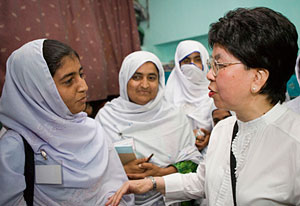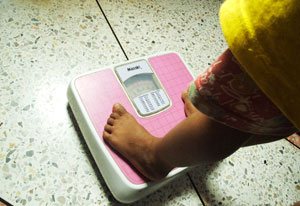WHO's Chan urges greater focus on chronic diseases
November / December 2013 | Volume 12, Issue 6

Photo by Christopher Black/WHO
A profound shift in public health practice is essential
to meet the surging noncommunicable disease
burden, WHO's Dr. Margaret Chan said.
No health system in the world is adequately prepared to cope with the looming surge in noncommunicable diseases such as diabetes, cancer and cardiovascular conditions, and all countries should make prevention of these chronic health threats a top priority, WHO Director-General Dr. Margaret Chan recently told an audience of U.S. Department of Health and Human Services (HHS) staff.
"Instead of diseases vanishing as living standards improve, socioeconomic progress is actually creating the conditions that favor the rise of noncommunicable diseases," which now cause more mortality than communicable diseases, she said. "Economic growth, modernization and urbanization have opened wide the entry point for the spread of unhealthy lifestyles."
Whereas in the past, obesity, cardiovascular disease, hypertension and similar chronic conditions were regarded as rich nations' problems, today 80 percent of the burden from these falls on low- and middle-income countries. Yet, Chan said, the health systems in developing countries were designed, staffed and equipped to manage brief episodes of acute illness from infectious diseases, not long-lasting conditions.
"This is a seismic shift that calls for profound changes in the mindset and profound changes in the practice of public health," she said. "Prevention must be the cornerstone of the global response to these diseases."
One way to prepare for this changing outlook is to build adequate capacity for tackling noncommunicable diseases, especially in developing countries, she urged, noting, "We need to provide the technical support so they can build self-reliance. Countries do not expect charity, they want capacity."
For instance, all countries need the infrastructure to conduct surveillance and respond to unusual disease patterns, to control the quality and safety of medicines and food, discover which diseases cause the heaviest burden and study whether interventions are working. "Some 85 countries in the WHO representing 60 percent of the world's population do not have reliable systems for civil registration and vital statistics," Chan said. "It begs the question, 'What are we measuring?' when you don't even know your denominator."
Developing countries need to do more to reduce the brain drain of their qualified medical and scientific workforce, Chan suggested, urging governments to provide functioning work environments and keep as low as possible the cost of medicine for their population.

Photo by Connelly La Mar/Photoshare
In the past, obesity, cardiovascular disease,
hypertension and similar chronic conditions were
regarded as rich nations' problems. Today 80
percent of the burden from these falls on low-
and middle-income countries.
Some noncommunicable diseases pose a particular threat to Asian populations, Chan noted, citing diabetes in China as an example. A national survey published in September's JAMA found that 114 million adults have diabetes, about 12 percent of the population. Most shocking, she observed, was the estimate that nearly half the total Chinese adult population has prediabetes - an additional 493 million people who are at risk for developing the full-blown disease. Scientists have attributed this development to rising incomes and changing lifestyles, including physical inactivity and an unhealthy diet.
Chan said the dietary shift is particularly ominous. "The cheapest, most convenient and tastiest foods are also the most unhealthy - high in energy and sodium, and low in nutrients. Their market penetration over a very short time is astonishing. Junk food is becoming the new staple global diet. This should be our concern."
She asked rhetorically, "When the cost of diabetes devours the economic gains, doesn't health deserve a prime place in the equation of what progress means?"
Even as countries build up their capacity to manage and prevent noncommunicable diseases, they cannot let down their guard against infectious diseases or other threats to public health such as counterfeit medicines, contaminated food and dangerously high levels of air pollution, Chan cautioned. She concluded that more than ever before, "the threats to health are more numerous, the causes more ominous and the burden more onerous."
More Information
To view Adobe PDF files,
download current, free accessible plug-ins from Adobe's website.